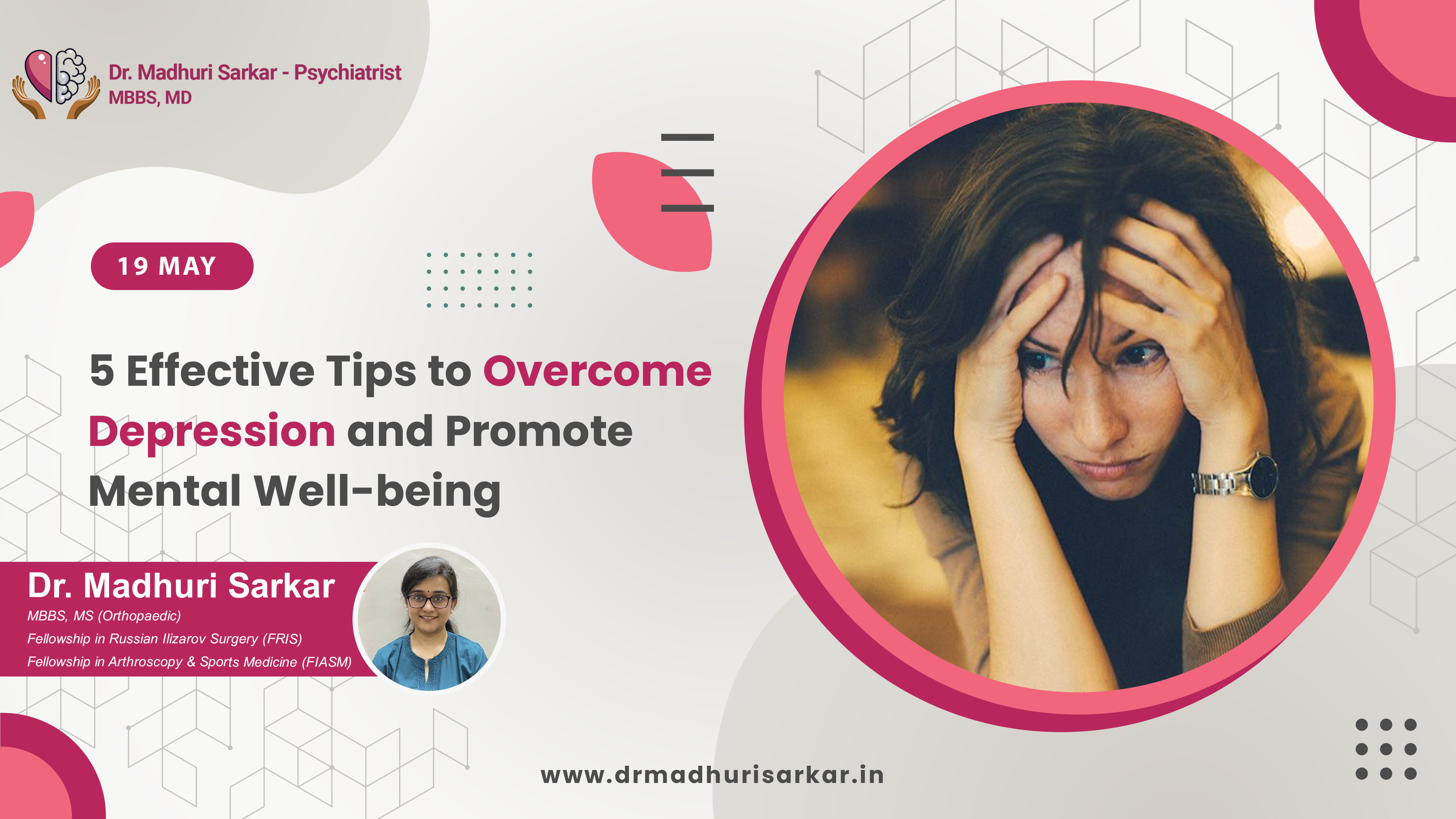
Introduction: Depression is a challenging and complex condition that affects millions of people worldwide. While it's important to seek professional help, there are several strategies you can incorporate into your daily life to support your mental well-being. In this blog post, we will explore five effective tips that can help you overcome depression and promote a more positive and fulfilling life. Seek Support: One of the most crucial steps in overcoming depression is reaching out for support. Share your feelings and experiences with someone you trust, such as a close friend, family member, or mental health professional. Talking about your emotions can alleviate the burden and provide a fresh perspective. Additionally, consider joining support groups where you can connect with individuals who understand what you're going through. Establish a Healthy Routine: Depression often disrupts regular daily routines, making it challenging to accomplish even basic tasks. Establishing a structured routine can provide a sense of stability and purpose. Start by setting small, achievable goals and gradually increase their complexity. Break tasks into manageable steps to prevent overwhelming feelings. Focus on incorporating activities that you enjoy, such as exercise, hobbies, or spending time in nature. Engaging in self-care is crucial during this process. Practice Self-Care: Self-care plays a significant role in managing depression. Allocate time each day for activities that nurture your mind, body, and spirit. This could include practicing mindfulness or meditation, engaging in physical exercise, getting enough sleep, maintaining a healthy diet, or pursuing creative outlets. Remember, self-care is not selfish; it's an essential part of your overall well-being. Challenge Negative Thoughts: Depression often brings about negative and self-deprecating thoughts. Learning to identify and challenge these thoughts is a crucial step toward overcoming depression. Practice self-reflection and mindfulness to become aware of negative patterns. Once you notice negative thoughts, question their validity. Are they based on evidence or distorted perceptions? Replace negative thoughts with positive and realistic affirmations. Cognitive-behavioral therapy (CBT) techniques can be particularly helpful in this process. Engage in Meaningful Connections: Human connections are vital for our mental well-being. While depression may make you want to withdraw from social activities, it's essential to foster meaningful connections. Surround yourself with supportive and understanding individuals who uplift your spirits. Participate in social events, join clubs or organizations aligned with your interests, or volunteer for a cause that resonates with you. Sharing experiences and connecting with others can help combat feelings of isolation and strengthen your support network. Conclusion: Overcoming depression is a journey that requires time, patience, and a multifaceted approach. While these tips can provide a starting point, it's important to remember that professional help is invaluable. Reach out to a mental health professional who can provide personalized guidance tailored to your specific needs. Remember, you are not alone, and there is hope for a brighter future.
Read More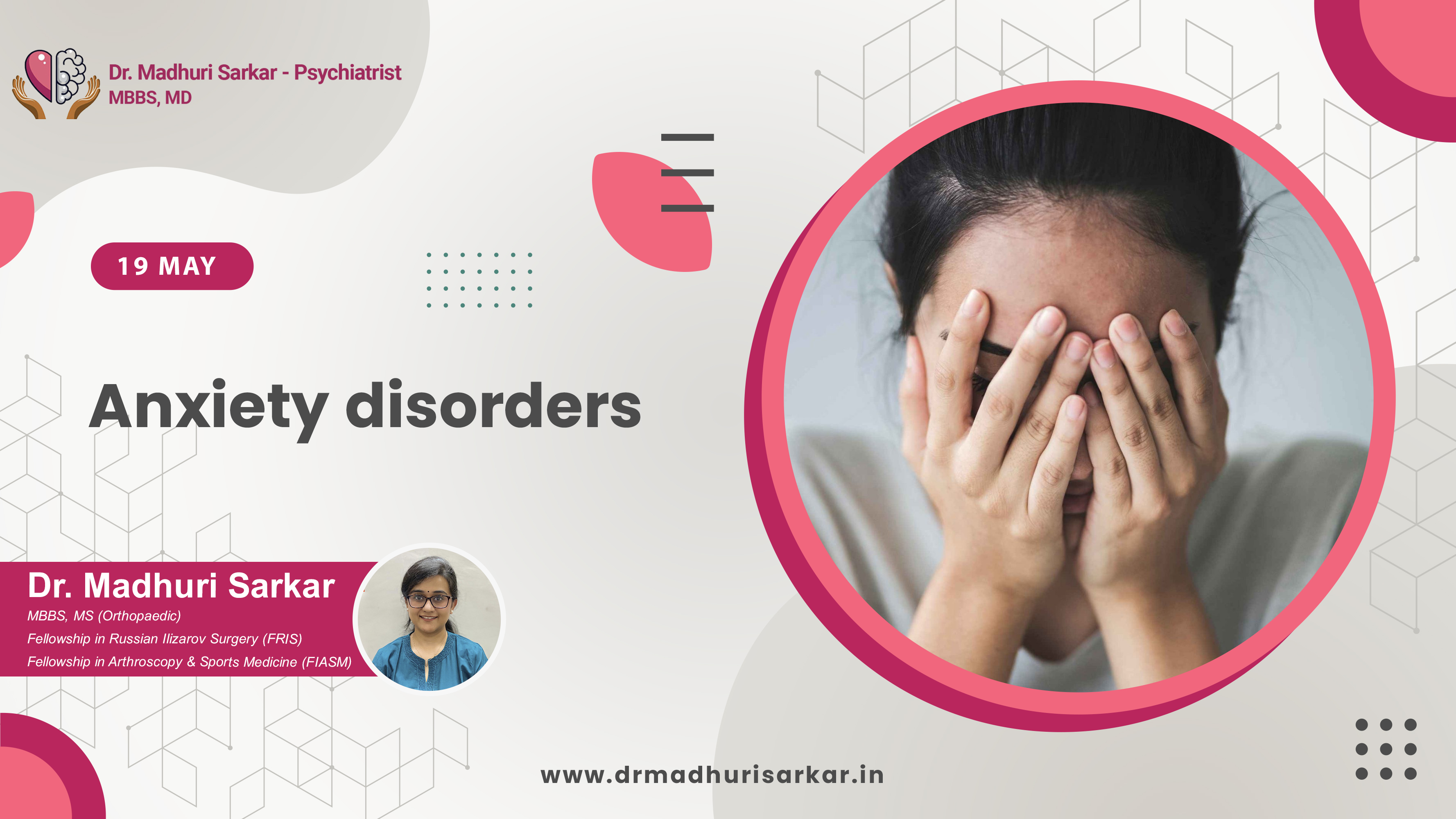
Anxiety disorders are a group of mental health conditions characterized by excessive and persistent feelings of fear, worry, and anxiety. There are several types of anxiety disorders, including: Generalized Anxiety Disorder (GAD): GAD is characterized by chronic and excessive worry about various aspects of life, such as work, health, and relationships, even when there is no specific cause for concern. Panic Disorder: Panic disorder involves recurrent and unexpected panic attacks. Panic attacks are intense episodes of fear and discomfort that may include symptoms such as rapid heart rate, sweating, trembling, shortness of breath, and a sense of impending doom. Social Anxiety Disorder (Social Phobia): Social anxiety disorder involves an intense fear of social situations or performance situations where individuals are exposed to possible scrutiny by others. People with social anxiety disorder often fear being embarrassed, humiliated, or judged by others. Specific Phobias: Specific phobias are intense and irrational fears of specific objects or situations. Common examples include fear of heights, spiders, flying, or enclosed spaces. These fears can lead to avoidance behaviors and significant distress when confronted with the phobic stimulus. Separation Anxiety Disorder: Separation anxiety disorder is commonly associated with children but can persist into adulthood. It involves excessive anxiety or fear about separation from home or attachment figures, leading to distress when separated and reluctance to leave familiar environments.
Read More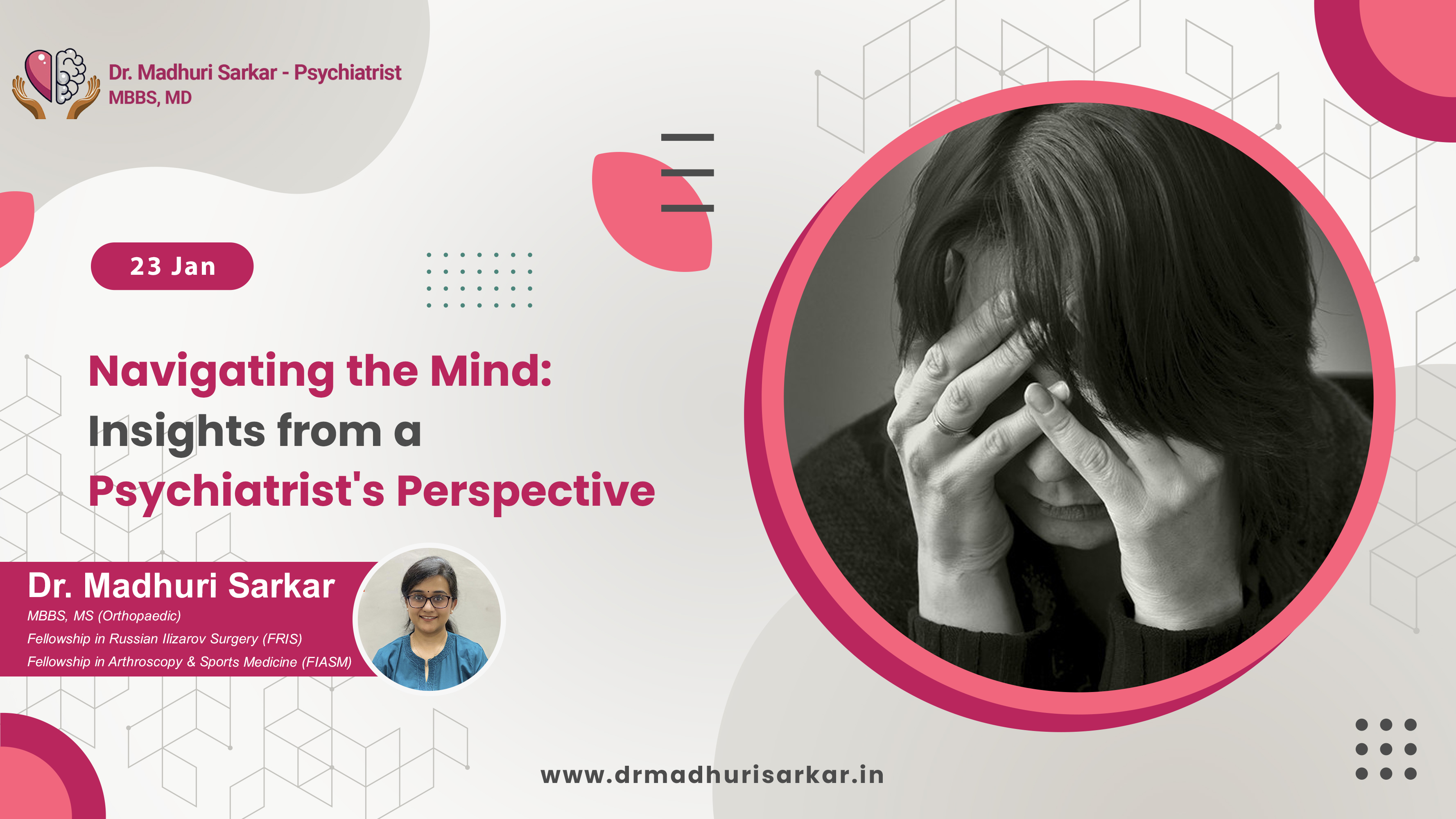
Introduction: Welcome to our blog, where we delve into the intricate landscape of the human mind, exploring the vast realms of mental health and well-being. As a dedicated psychiatrist, my mission is to share knowledge, offer guidance, and foster a deeper understanding of the complexities that shape our mental and emotional experiences. 1. **Unveiling the Mysteries of the Mind: A Psychiatrist's Journey** In this inaugural post, I'll share my personal journey as a psychiatrist, shedding light on the challenges, triumphs, and profound moments that have fueled my passion for understanding and healing the mind. 2. **Breaking the Stigma: Demystifying Mental Health** Addressing the prevalent stigma surrounding mental health is crucial. In this post, we'll explore common misconceptions, challenge stereotypes, and advocate for a more compassionate and informed approach to mental well-being. 3. **The Mind-Body Connection: Holistic Approaches to Mental Wellness** Delve into the intricate interplay between the mind and body. We'll discuss how lifestyle, nutrition, and physical activity can significantly impact mental health, offering practical tips for achieving a holistic and balanced life. 4. **Nurturing Resilience: Coping Strategies for Life's Challenges** Life is full of ups and downs, and building resilience is key to navigating these challenges. This post will explore evidence-based coping strategies, mindfulness techniques, and resilience-building exercises to help individuals bounce back from adversity. 5. **Understanding Anxiety: A Comprehensive Guide** Anxiety is a prevalent mental health concern. In this post, we'll delve into the various forms of anxiety disorders, their symptoms, and effective treatment approaches. Practical tips for managing anxiety in daily life will also be shared. 6. **Depression: Shining a Light on the Shadows** Depression affects millions globally, yet there's much to be understood about this complex condition. We'll explore the nuances of depression, discuss evidence-based treatments, and offer insights into supporting individuals on their journey to recovery. 7. **Relationships and Mental Health: The Symbiotic Connection** Relationships play a pivotal role in our mental well-being. This post will explore the impact of healthy and toxic relationships on mental health, providing guidance on fostering positive connections and setting boundaries. 8. **Mindful Parenting: Nurturing Children's Mental Health** Parenting comes with its own set of challenges, and nurturing children's mental health is paramount. We'll discuss the importance of mindful parenting, effective communication, and creating a supportive environment for children to thrive emotionally. 9. **Emerging Trends in Psychiatry: Harnessing Technology for Mental Health** The field of psychiatry is evolving with advancements in technology. This post will explore innovative approaches, such as teletherapy, mental health apps, and virtual reality, and their potential impact on improving accessibility and effectiveness of mental health care. 10. **Ask the Psychiatrist: Your Mental Health Questions Answered** Concluding our series, I invite you to submit your mental health questions. I'll address selected queries in a Q&A format, providing valuable insights and guidance to our readers. Join me on this exploration of the mind, where we'll navigate the complexities of mental health with empathy, knowledge, and a commitment to promoting well-being for all.
Read More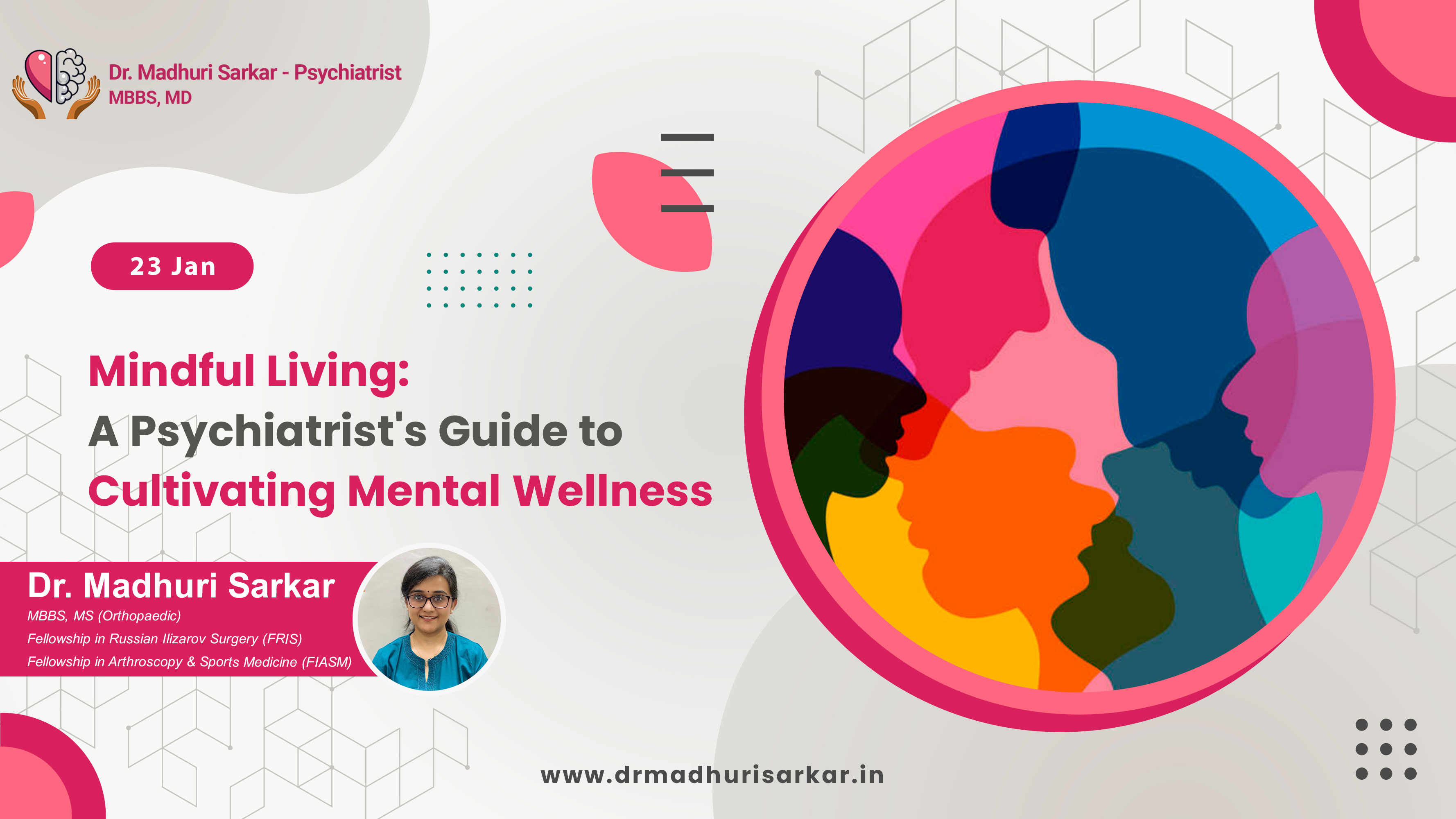
Introduction: Step into the realm of mindful living, where the art of being present meets the science of mental wellness. As a psychiatrist deeply committed to promoting holistic health, I invite you on a journey to explore practical strategies and insights for incorporating mindfulness into your everyday life. The Power of Now: Embracing Mindfulness in Daily Life In this post, we'll delve into the foundations of mindfulness, exploring its roots in ancient practices and understanding how being present in the moment can positively impact mental well-being. Learn simple techniques to cultivate mindfulness in your daily routine. Mindful Eating: Nourishing the Body and Soul Explore the concept of mindful eating as a gateway to improved mental health. We'll discuss the connection between nutrition and mood, offering tips on savoring your meals, making conscious food choices, and fostering a positive relationship with food. Mindfulness Meditation: A Journey Inward for Mental Clarity Meditation is a powerful tool for calming the mind and reducing stress. Discover different mindfulness meditation techniques, suitable for beginners and seasoned practitioners alike, and learn how to integrate them into your daily life for enhanced mental clarity. Mindful Movement: Yoga and Its Mental Health Benefits Uncover the profound impact of yoga on mental well-being. We'll explore the mind-body connection inherent in yoga, discussing its ability to reduce stress, improve mood, and enhance overall mental resilience. Beginners' tips and poses will be shared for those eager to start their yoga journey. Digital Detox: Navigating the Information Age Mindfully In today's fast-paced, technology-driven world, digital detox is essential for mental well-being. This post will provide insights into the importance of balancing screen time, practical tips for reducing digital overload, and ways to create a healthier relationship with technology. Nature Therapy: The Healing Power of the Great Outdoors Nature has a profound impact on mental health. We'll explore the concept of ecotherapy, discussing the therapeutic benefits of spending time in nature, cultivating a sense of awe, and fostering a deeper connection with the natural world. Mindful Sleep: Unwinding for a Restful Night Quality sleep is a cornerstone of mental wellness. Learn about the principles of mindful sleep hygiene, including relaxation techniques, bedtime rituals, and mindful breathing exercises to promote a restful night's sleep. Gratitude Practice: Shifting Perspectives for Mental Well-Being Explore the transformative power of gratitude in cultivating a positive mindset. We'll discuss the science behind gratitude, share practical gratitude exercises, and explore how incorporating gratitude into your daily life can enhance mental well-being. Mindful Communication: Building Stronger Connections Effective communication is vital for mental and emotional health. This post will delve into the principles of mindful communication, providing practical tips for active listening, expressing yourself authentically, and fostering healthier relationships. Mindfulness for Stress Management: Tools for Everyday Challenges Concluding our series, we'll explore mindfulness tools and techniques specifically designed for managing stress in everyday life. From quick mindfulness exercises to integrating mindful moments into your routine, discover strategies for building resilience in the face of life's challenges. Embark on this journey of mindful living, where each moment becomes an opportunity to cultivate mental wellness, resilience, and a deeper connection to yourself and the world around you.
Read More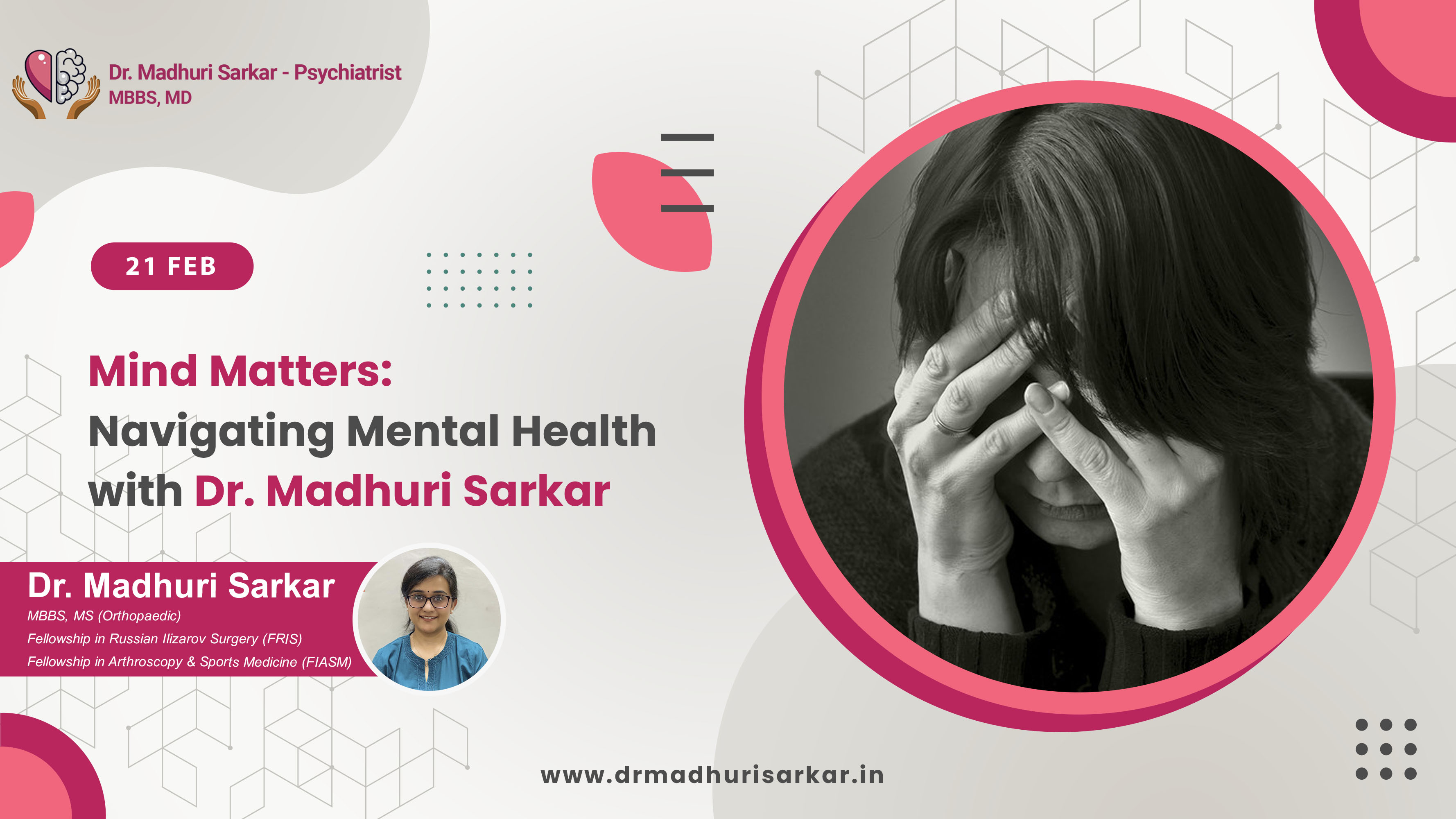
Introduction: Welcome to Mind Matters, a space dedicated to exploring the intricacies of mental health and well-being. As a psychiatrist with [X years] of experience, I am passionate about providing insights, resources, and support to help you navigate the complexities of the mind. Whether you're seeking practical tips for managing stress, curious about therapy approaches, or simply looking for a community that understands, you've come to the right place. 1. Demystifying Mental Health Medications: Understanding Your Options In this post, we delve into the world of psychiatric medications, debunking common misconceptions and shedding light on how different medications work, their potential side effects, and what to consider when discussing treatment options with your healthcare provider. 2. Coping with Anxiety: Strategies for Finding Calm in Chaos Anxiety can feel overwhelming, but it's important to remember that you're not alone. In this article, we explore practical strategies for managing anxiety, from mindfulness techniques to lifestyle changes that can make a big difference in your day-to-day well-being. 3. The Power of Therapy: Exploring Different Approaches Therapy can be a transformative journey towards healing and self-discovery. Here, we take a closer look at different therapy approaches, from cognitive-behavioral therapy (CBT) to psychodynamic therapy, helping you understand what to expect and how to find the right fit for your needs. 4. Breaking the Silence: Ending Mental Health Stigma Stigma surrounding mental illness can prevent individuals from seeking help and support. In this post, we discuss the importance of breaking the silence, challenging stereotypes, and fostering open conversations about mental health to create a more compassionate and supportive society. 5. Nurturing Your Mental Well-being: Self-Care Practices for Every Day Self-care is an essential aspect of maintaining good mental health. Here, we share practical self-care practices that you can incorporate into your daily routine to nurture your mind, body, and spirit. 6. Finding Strength in Vulnerability: The Power of Sharing Your Story Personal stories have the power to inspire, educate, and heal. In this article, we explore the importance of sharing your mental health journey, reducing feelings of isolation, and building connections within our community. Conclusion: Thank you for joining us on this journey through the complexities of the mind. At Mind Matters, we're committed to providing a safe and supportive space where you can find information, inspiration, and solidarity on your mental health journey. Remember, you are not alone, and there is always hope for healing and growth. Stay tuned for more insights, resources, and stories to come. Until then, take care and remember that your mental health matters.
Read More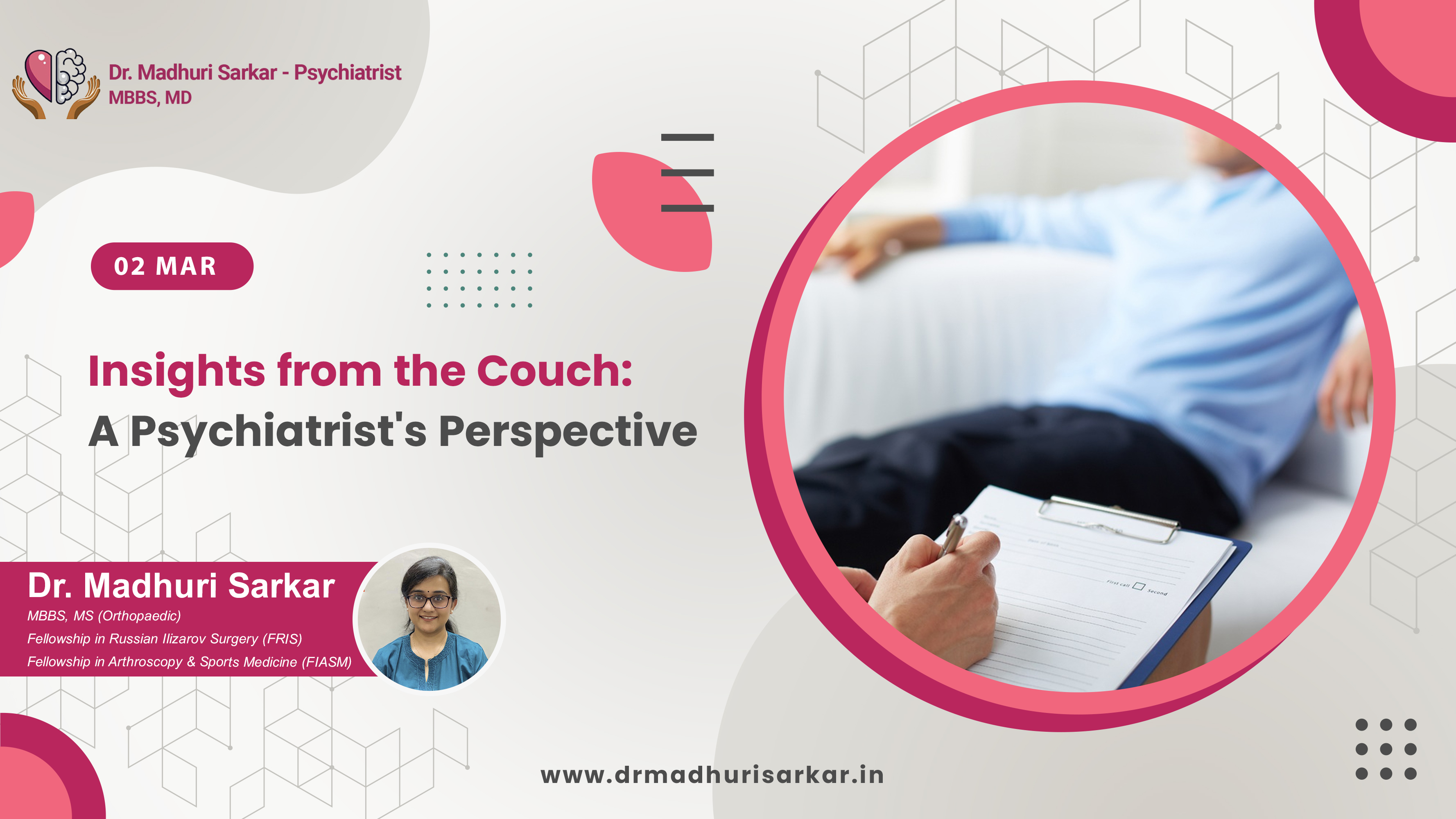
Welcome to "Insights from the Couch"! Here, we delve into the fascinating world of psychiatry, exploring the human mind and its complexities. As a practicing psychiatrist, I'm excited to share my experiences, knowledge, and insights on various mental health topics. 1. Understanding Mental Health: In our first series of posts, we'll start with the basics. What is mental health, and why is it important? We'll explore common misconceptions, stigma, and the vital role mental well-being plays in our lives. 2. The Mind-Body Connection: One of the fundamental principles in psychiatry is the intricate relationship between the mind and the body. Join me as we explore the latest research on how our thoughts, emotions, and behaviors impact our physical health and vice versa. 3. Navigating the World of Therapy: Therapy is a cornerstone of mental health treatment. In this series, we'll discuss different types of therapy, such as cognitive-behavioral therapy (CBT), psychodynamic therapy, and mindfulness-based approaches. I'll share insights into how therapy works and what to expect if you're considering seeking help. 4. Spotlight on Mental Disorders: From anxiety and depression to schizophrenia and bipolar disorder, mental illness affects millions worldwide. In this series, we'll take a closer look at various mental disorders, including their symptoms, causes, and treatment options. 5. Breaking Down Stigma: Despite progress in mental health awareness, stigma remains a significant barrier to treatment. We'll explore the origins of stigma, its impact on individuals and communities, and strategies for combating it. 6. Mental Health in Pop Culture: Movies, books, and TV shows often portray mental illness in various ways. In this series, we'll analyze depictions of mental health in popular culture, separating fact from fiction and discussing the influence of media on public perceptions. 7. Self-Care and Well-Being: Maintaining good mental health isn't just about treating illness—it's also about nurturing well-being. Join me as we explore practical strategies for self-care, stress management, and building resilience in the face of life's challenges. 8. The Future of Psychiatry: As our understanding of the brain and behavior continues to evolve, so too does the field of psychiatry. In this series, we'll explore emerging trends, technologies, and treatment modalities shaping the future of mental health care. 9. Ask the Psychiatrist: Have burning questions about mental health, therapy, or psychiatry in general? In this series, I'll address common inquiries from readers, offering evidence-based insights and practical advice. Whether you're a mental health professional, someone living with a mental illness, or simply curious about the workings of the mind, "Insights from the Couch" aims to inform, inspire, and foster greater understanding and compassion for the human experience. So, grab a cup of tea, get comfortable, and let's embark on this journey together.
Read More
Welcome to The Mindful Practitioner: Elevating the Art and Science of Psychology, a comprehensive blog dedicated to empowering mental health professionals, students, and enthusiasts with the knowledge and tools they need to thrive in the dynamic field of psychology. Our mission is to bridge the gap between cutting-edge psychological research and practical application, fostering a community of mindful, informed, and compassionate practitioners. In an era where mental health is increasingly recognized as a crucial component of overall well-being, The Mindful Practitioner serves as your trusted guide through the complexities of psychological practice. Our blog covers a wide range of topics, including the latest advancements in therapeutic techniques, innovative approaches to treatment, and insightful analyses of mental health trends and issues. Key Features: Research and Innovation: Dive into in-depth articles that break down the latest research findings in psychology. Our team of experts curates and explains complex studies in a way that is accessible and relevant to your practice. Stay informed about emerging therapies, neuroscience discoveries, and evidence-based practices that can enhance your work with clients. Therapeutic Techniques: Explore a variety of therapeutic approaches such as Cognitive Behavioral Therapy (CBT), Dialectical Behavior Therapy (DBT), Eye Movement Desensitization and Reprocessing (EMDR), and more. Our detailed guides and case studies provide practical insights into the application and effectiveness of these methods. Ethics and Professional Development: Navigate the ethical challenges that psychologists face with confidence. We offer thoughtful discussions on common ethical dilemmas, professional standards, and best practices for maintaining integrity in your work. Additionally, find resources and tips for continuing education and career advancement. Self-Care and Wellness: As a mental health professional, your well-being is paramount. Our self-care section is dedicated to helping you manage stress, prevent burnout, and maintain a healthy work-life balance. Discover mindfulness exercises, relaxation techniques, and strategies for personal growth. Social Issues and Advocacy: Engage with critical discussions on the role of psychologists in addressing social justice, diversity, and inclusion. Learn how to be an advocate for change within your practice and community, and explore the intersection of psychology and societal issues. Book Reviews and Resources: Stay up-to-date with our curated selection of must-read books, journals, and online resources. Our reviews provide insights into valuable literature that can enhance your understanding and practice of psychology. Community and Collaboration: Join a vibrant community of like-minded professionals and enthusiasts. Share your thoughts, experiences, and questions in our comment sections, and participate in webinars and discussions hosted by leading experts in the field. At The Mindful Practitioner, we believe that knowledge is most powerful when shared. Our goal is to create a supportive and enriching environment where you can continuously learn, grow, and make a positive impact in the lives of those you serve. Whether you're just starting your journey in psychology or looking to deepen your expertise, our blog is here to support and inspire you every step of the way.
Read More